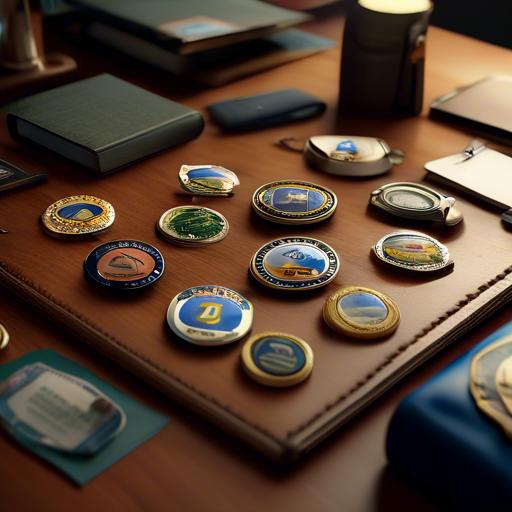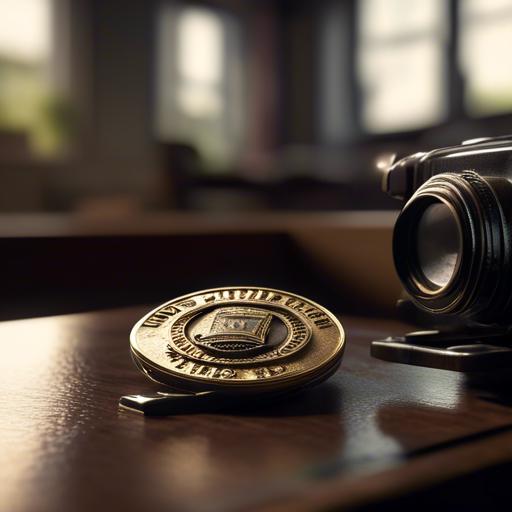As a child, I was always captivated by the mysterious world of private investigators depicted in movies and television shows. From thier cunning disguise techniques too their keen investigative skills, I was fascinated by the ways in which these elite sleuths brought justice to the unjust. One burning question that always lingered in my mind was whether or not private investigators actually carried badges like the ones seen in the movies. After delving into the world of private examination, I discovered the answer may not be as black and white as we ofen see on screen. Join me as we explore the truth behind the question: do private investigators have badges?
– The significance of badges for private investigators
Private investigators often carry badges to identify themselves and establish their credibility in the field. These badges serve as a symbol of authority and professionalism, allowing private investigators to gain access to various locations and gather data discreetly. A badge can help clients feel more secure knowing that they are working with a legitimate and experienced investigator.
In addition to building trust with clients, badges also help private investigators navigate their investigations more effectively. With a badge, investigators can easily identify themselves to witnesses, law enforcement officers, and other individuals they encounter during the course of their work. This can help prevent misunderstandings and ensure that the investigation proceeds smoothly.
– Legal requirements for private investigators to carry badges
Private investigators are required to carry badges in many jurisdictions to identify themselves while conducting investigations.These badges serve as official credentials that allow private investigators to show their authority and legitimacy when interacting with clients, witnesses, and law enforcement officers. By carrying a badge, private investigators can demonstrate their professionalism and adherence to legal regulations in the field.
In addition to being a necessary tool for identification, badges for private investigators may also be required by law in some states. These badges typically include the investigator’s name, license number, and agency information. While the specific design and requirements for badges vary by state, they are generally used to distinguish private investigators from individuals who may falsely claim to be conducting investigative work. By displaying their badges prominently, private investigators can uphold ethical standards and ensure they are operating within the confines of the law.
– How to verify the legitimacy of a private investigator’s badge
Private investigators frequently enough carry badges to help establish their authority and credibility when conducting investigations. As these badges are not standardized and can vary in design, it is indeed critically important to verify the legitimacy of a private investigator’s badge before providing them with any sensitive information or allowing them access to your property.To verify the legitimacy of a private investigator’s badge, consider the following tips:
– Ask to see identification along with the badge to confirm the investigator’s identity.
– Check for specific markings or logos that may indicate the badge is legitimate.
– Contact the agency or organization the investigator claims to be affiliated with to verify their credentials.
– Trust your instincts and be wary of any inconsistencies or red flags that may indicate the badge is not legitimate.
remember, it is always better to be cautious and confirm the legitimacy of a private investigator’s badge before sharing any personal information or cooperating with their investigation.
– Recommendations for hiring a private investigator with a valid badge
When hiring a private investigator, it is crucial to ensure that they have a valid badge. A badge is a physical representation of the investigator’s credentials and can help verify their authenticity. Before hiring a private investigator, make sure to ask for their badge and verify its validity through the appropriate channels. It is a red flag if an investigator is unable or unwilling to provide their badge for verification.
In addition to checking for a valid badge, it is important to look for recommendations when hiring a private investigator.Recommendations from trusted sources can help ensure that you are hiring a reputable and reliable investigator. Look for reviews online, ask for recommendations from friends or family, and consider working with private investigator agencies that have a solid reputation in the industry. By taking the time to do your research and verify credentials, you can hire a private investigator with confidence.
Q&A
Q: Do private investigators have badges?
A: Private investigators do not typically have badges like law enforcement officers do. They usually have some form of identification, such as a license or credentials, to show that they are authorized to conduct investigations.
Q: How do private investigators identify themselves?
A: Private investigators often carry identification cards or credentials that include their photograph, name, contact information, and licensing information. this allows them to easily prove their credentials to clients, subjects of investigations, and authorities if necessary.
Q: Why don’t private investigators have badges?
A: Private investigators work in a different capacity then law enforcement officers. While they may have similar investigative skills, they do not have the same authority or powers. Badges are typically associated with official law enforcement agencies and are used to signify an officer’s authority.
Q: Are private investigators required to show identification?
A: Yes, private investigators are required to carry and display their identification when conducting investigations. This helps to ensure that they are operating within the bounds of the law and have the necessary credentials to perform their job.
Wrapping Up
the question of whether private investigators have badges is one that may vary depending on the jurisdiction in which they operate.While some may be required to carry official credentials, others may not.It is indeed critically important to remember that the role of a private investigator is one that requires a high level of trust and professionalism, nonetheless of the presence of a badge. So, the next time you see a private investigator on the case, rest assured that their dedication to uncovering the truth remains unwavering, badge or no badge. Thank you for joining us on this investigative journey. Stay tuned for more insights into the world of private investigation.


